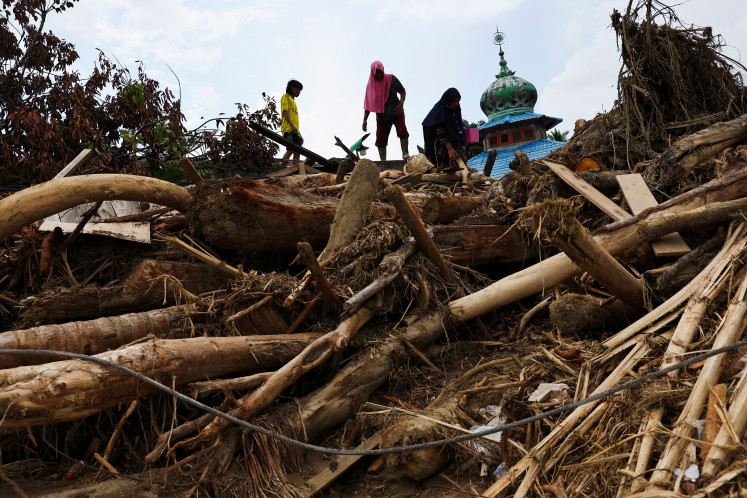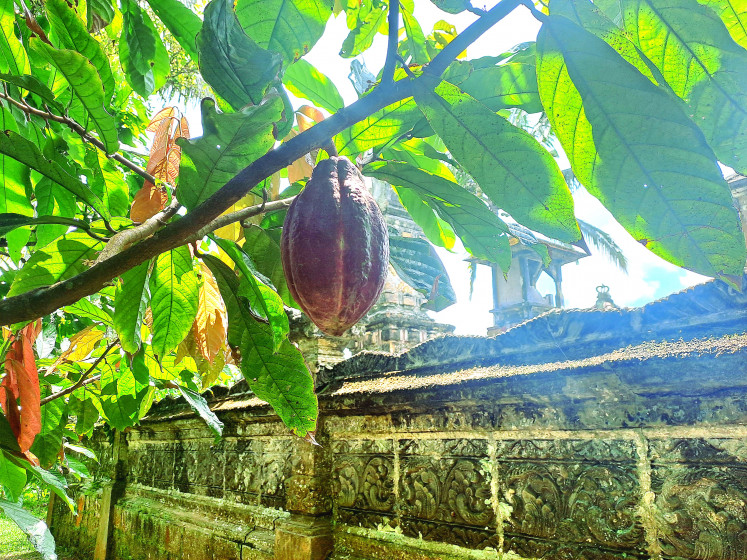Popular Reads
Top Results
Can't find what you're looking for?
View all search resultsPopular Reads
Top Results
Can't find what you're looking for?
View all search resultsIndonesia and Africa: Beyond the Bandung Spirit
At the 2014 World Economic Forum, the global managing director of McKinsey and Company spoke of a continent that “represents our fastest-growing region in the world
Change text size
Gift Premium Articles
to Anyone
A
t the 2014 World Economic Forum, the global managing director of McKinsey and Company spoke of a continent that “represents our fastest-growing region in the world.” He said “if you want to be relevant, you need to be in this part of the world.” If one was to guess the region being referred to, chances are many would get it wrong, as the answer was Africa.
Just as Indonesia has transformed over the past couple of decades, so has Africa. The continent now has a US$2 trillion economy with about a third of its countries registering growth of more than 6 percent annually. In fact, out of the world’s top 10 fastest growing economies, six are from Africa. As Africa is brimming with tremendous potential, is Indonesia a part of the story?
The bond between Indonesia and Africa is forged by the shared historic solidarity against colonialism. Indonesia was one of the sponsors of the 1955 Asian-African Conference that helped pave the way for the national awakening and independence of some African countries with the so-called Bandung Spirit. While the conference and the Bandung Spirit are of paramount importance, today we have gone beyond.
In this regard, Indonesia has bolstered its cooperation with Africa. From 2000 to 2014, Indonesia-Africa trade value jumped more than fivefold to $11.7 billion. Today, Africa is a major non-traditional market for Indonesia. Amid the global economic slowdown, sluggish demand and low commodity prices, Indonesia’s exports to some African markets bucked the trend. In 2016, Indonesian non-oil and gas exports to South Africa increased 9 percent, while exports to Benin rose 16 percent.
Indonesia has not only exported its traditional commodities to Africa but has also exported some of its value-added manufactured goods, including aircraft, to Senegal, Guinea and Burkina Faso. It is worth noting that some of the largest contributors to the annual Trade Expo Indonesia hail from Africa.
Indonesian companies have also invested in Africa in a wide array of sectors, including palm oil, textiles, food and beverage, energy and consumer products. An Indonesian instant noodle brand controls approximately 74 percent of the market share in Nigeria with an estimated annual growth of 40 percent.
Notwithstanding the positive signs, we cannot be complacent. Our trade value with Africa is dwarfed by the trade value between the continent and India, which stood at $70 billion or by Africa-China trade that reached $200 billion.
We realize that current bilateral cooperation between Indonesia and Africa is still way below potential, and as such Indonesia is determined to advance its cooperation with Africa. A testament of that commitment is my visit to three African countries this week, namely to Egypt, South Africa and Mozambique. It will lay the ground for President Joko “Jokowi” Widodo’s tour to the region in the near future.
The focus of our relations will be economic cooperation. That is why in my visit I will bring along prominent Indonesian businesspersons. I will also speak before the business forum in South Africa and Mozambique. In order to boost trade, I will explore the possibility of further expansion of our strategic industry to the region. For example, the Indonesia railway industry has interest in exporting passenger trains to Africa.
Going forward, we need to address the issue of financing, which is a major hurdle for two-way trade. As the result of this impediment, a substantial part of our trade has to pass through third parties, which renders it more costly. I encourage export-import banks of both sides to step up and facilitate the financial transactions, which eventually will foster our trade. There is also the option to conduct counter trade.
As the African economy rises, there has been growing interest from Indonesian companies to invest there, particularly in energy. Indonesian state-owned oil and gas company Pertamina has actively sought to spread its wings in the region.
Aside from seeking to gain benefit from its ties to Africa, Indonesia is also keen on supporting Africa’s development. That is why we need to promote the technical South-South cooperation, with which Indonesia has endeavored to support Africa’s development. Indonesia has provided capacity building assistance in numerous areas to Africa, including agriculture, maritime and fisheries and human resources. Indonesia has also donated hand tractors to Senegal and Gambia to support agricultural mechanization.
Indonesia and Africa also need to foster regional cooperation, including through the Indian Ocean Rim Association (IORA). I welcome the IORA member states from Africa to attend the first IORA summit in Indonesia in March. I felt honored to speak before the African Union Meeting when Indonesia was accepted as an observer of the group in 2015.
The Bandung Spirit may not define our future cooperation, but it can and must inspire Indonesia and Africa to elevate our partnership to new heights. African countries remain our close friends with whom we share values and solidarity. More than that, now they are also increasingly strategic partners for Indonesia, which is why it is only natural for Africa to be high on Indonesia’s foreign policy agenda, as reflected by the fact that my visit to Africa occurs in the beginning of this year. Moreover, we also envision an Indonesia-Africa Forum as a platform for both parties to discuss issues of mutual concern and advance bilateral partnership as well as regional cooperation to promote shared stability and prosperity.
For our own interest, it is imperative for us to foster mutually beneficial cooperation with Africa, the continent of hope.
_______________________________
The writer is the Indonesian foreign minister.










